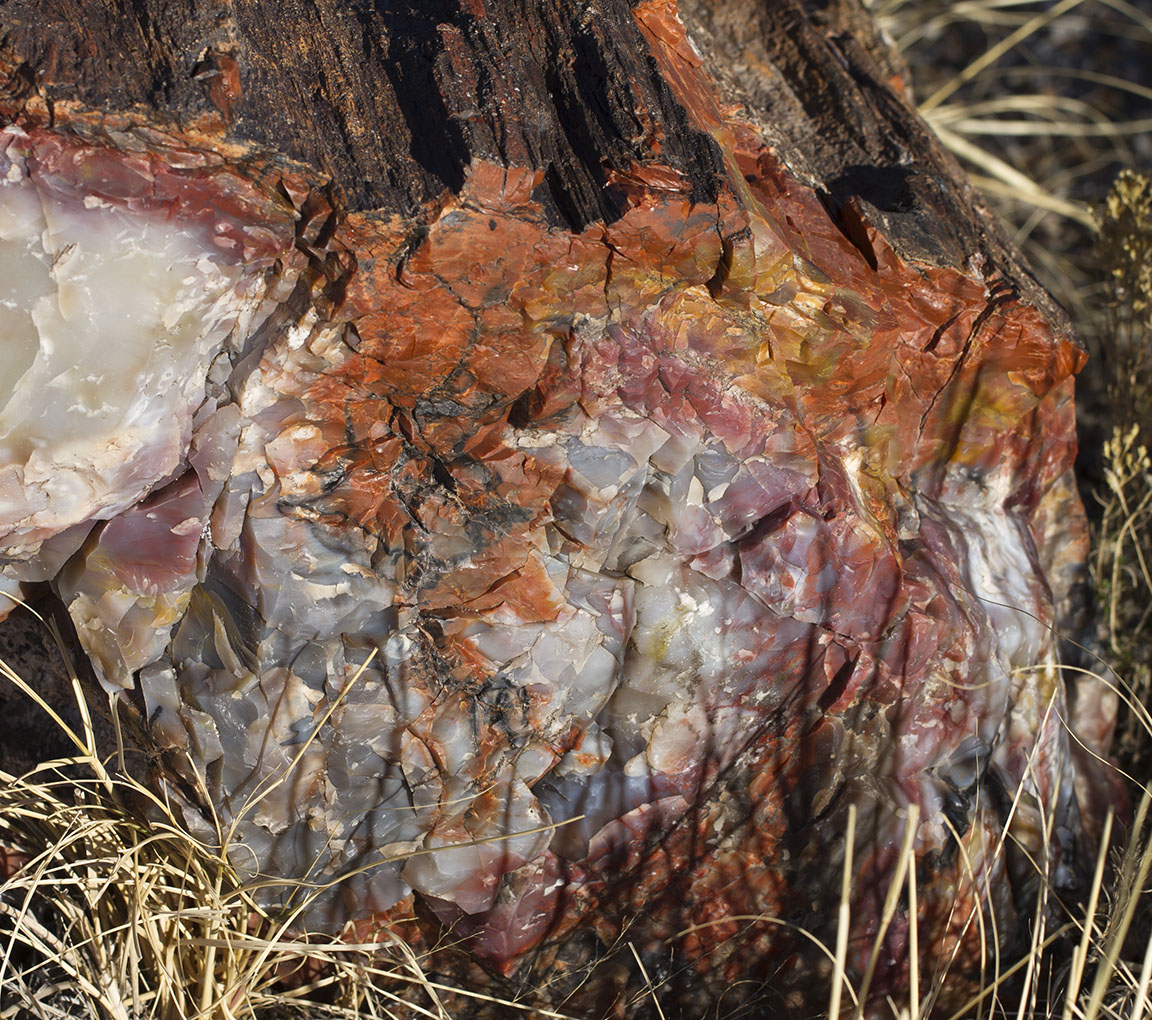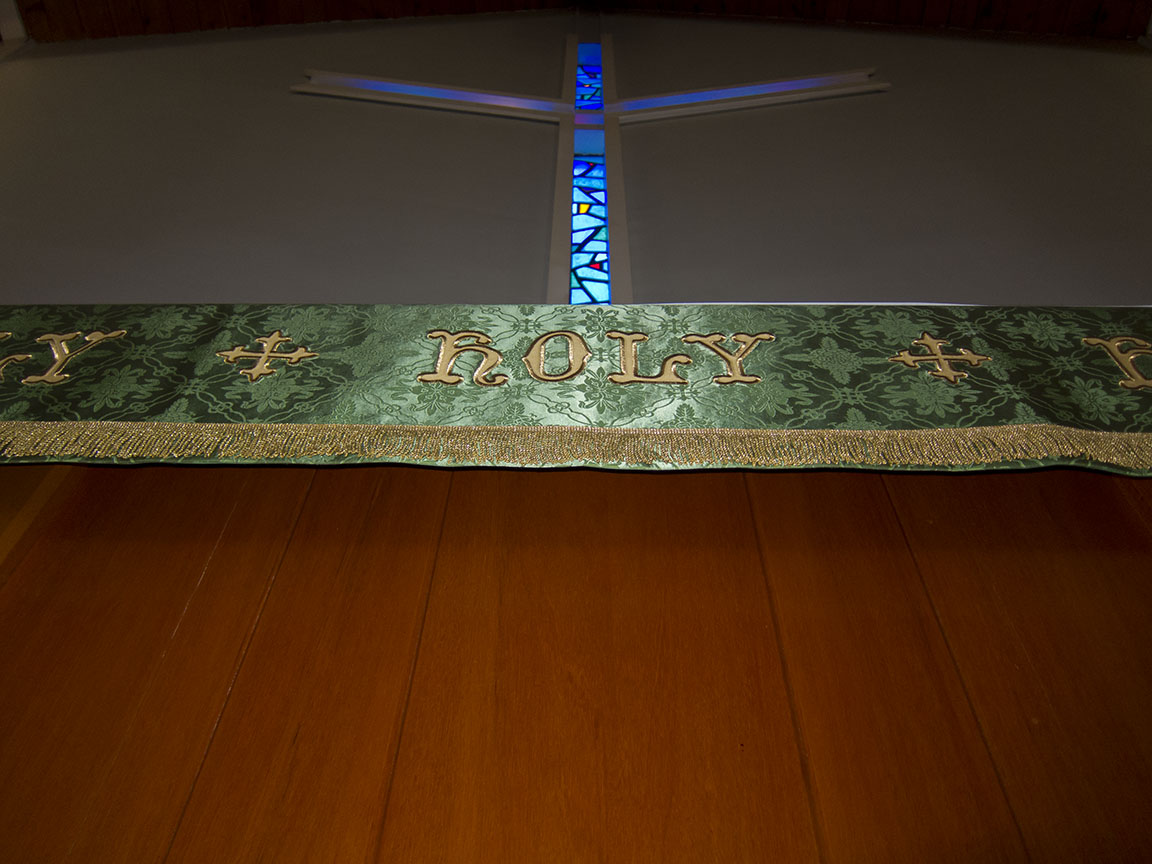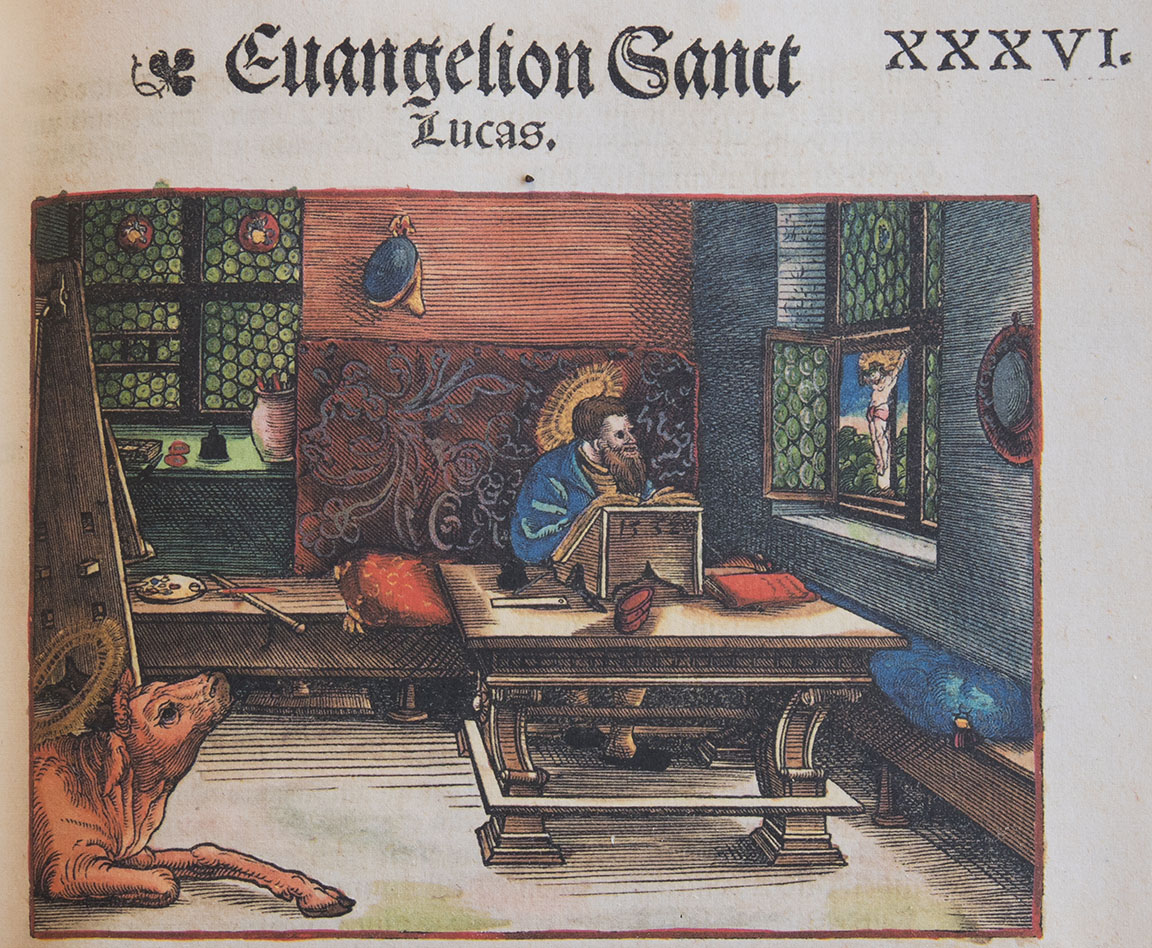Rev’d Mark B. Stirdivant, Good Shepherd Lutheran Church, Yucaipa, California
✝ sdg ✝

Petrified Log
Have you ever wondered: Why is there so much talk about money in the Bible? If the Holy Scriptures were written to bear witness to God and what He has done to bring us to heaven, why does such an earthly, temporary subject receive such attention within them? Someone has pointed out that, as recorded in the Gospels, Jesus made more specific statements about money than He did talking about heaven! With so much to say about it, you would think that our Lord has a point to make.
And what Jesus says about money on this occasion can really make a person cock his head. It’s kind of like the dog in the famous American icon that’s looking strangely at the bell of a phonograph, as it listens with canine bewilderment to “His Master’s Voice.” You could just see the similar looks on those disciples’ faces: really, Jesus? Two small half-pennies turn out to be worth more than a large lump-sum? Not in my budget at least! The Gospel may be foolishness to the world, but that does not mean that any sort of foolishness all of a sudden becomes the Gospel! Or could it be possible that Jesus is commanding them and us that we are to give ourselves into financial ruin? Surely there’s no lasting benefit to the church that way, right? It seems to demand a reason from within the Bible itself why the Holy Spirit would be so concerned both about sins that are associated with money and possessions, as well as positive avenues that redeemed Christians may take with the resources that they have.
But is it really as simple as that? Could there be more to the Bible’s message on money than: on the one hand, stop stealing and acting greedy, and on the other hand, give all the money you can to help spread God’s Word to all nations? Sadly for many, that’s all they see within the Bible. Just directions for you to follow so you can live right. Sins for you to avoid if you want to go to heaven. There’s no more message to be found in the Scriptures for those who read them in that way. Because if we follow the principles that the Bible lays down and act like Godly people, then, so the common wisdom goes, we will receive blessings from the Father’s hand. If we perceive somehow that a decision we make is the one that God wanted us to make, then we look for something good to happen just because we seem to find that promise in His Word.
But I must tell you that that is a false and misguided way to look at the Bible. It brings in a dangerous philosophy, among others, that is called moralism. Now, morals are well and good and they are found in prominent places of God’s revealed Word like in the Ten Commandments. But Moral-ism takes morals and makes them the ONLY thing. As a result, the rest of the Bible gets thrown off-balance, so that its spiritual benefits get reduced or eliminated. And that leads to big problems later on.
So now that you know at least one pitfall to avoid, read over the Gospel story so that you can arrive at the true reason why this episode is recorded by the Divine Inspiration of the Holy Spirit. The first thing that you should consider is the context of this event. Ask yourself, what has happened before this; what will soon happen afterward? All of Mark chapter 12 seems to have taken place within the Temple complex, which is a collection of buildings and open areas located on the highest point of the city of Jerusalem. You could imagine that the place was just getting all picked up and swept after Jesus overturned tables and kicked out the moneychangers the previous day. The time, of course, is Holy Week, just days before the final Passover, which would culminate in the sacrifice of Christ the Lamb of God on the cross.
The death of God’s Son in human flesh is right around the corner. Every screaming animal that gives its life in sacrifice all around Jesus and His disciples marks the time as getting closer and closer. Blood is everywhere as a constant reminder that your sins require blood to pay off the offensive debt you owe. The temple sacrifices persistently proclaim that bulls, goats, lambs and birds can’t take away your sin, only the coming Savior can. And now, there is the Savior, right in the Temple, right in and amidst those sacrifices and offerings. He’s taking a break from His steady preaching to the crowds, in order to observe a widow and privately teach His future pastors and servants of the Word.
In this poor widow’s action, your Lord and Savior spotted a clear reflection of His holy action. That is to say, when she gave up all that she had, even when she had nothing, she perfectly portrayed how Jesus, after setting aside heavenly glory in order to serve mankind, would soon give up everything to the point of death, even death on the cross. You see, Jesus points out the widow not to tell you what you should do, but to reveal before your very eyes what He has done and will continue to do for your salvation. Here’s how St. Paul said it years later: “Though He was rich, yet for your sake He became poor, so that you by His poverty might become rich.” (2 Cor. 8:9) The disciples though, even at this late time in the story, were still not completely “getting it.” They were still stuck in some way on the idea that the promised Messiah would be a flashy, take-charge, overthrow the Roman government kind of Savior. If there would be any example of His outpouring of good for Israel, the disciples would have bet on the big givers, not the miserable, vulnerable widow.
But Jesus is not fooled by what seems wise in men’s eyes. His power is made perfect in weakness, as He pointed out personally to St. Paul years later. The Holy Spirit moved the Evangelist Mark to write about the widow not as a means to shame you on your stewardship, but to proclaim the magnificent, giving nature that God possesses. It is a giving from which you have benefited greatly. It is a giving nature that He plants within your heart, even as He desires to restore His divine image upon you.
Have you put that giving nature to work in your life? Or have you used what is yours for a less-than godly purpose? Often times the question on people’s minds in the area of stewardship is, what can I spare from my time, talent and treasure to give to the Lord…when the question ought to be, how much of God’s gifts to me in these three categories do I dare hoard for myself? There’s miles of difference between devoting to the Lord from your first fruits, than there is scraping up what’s left at the bottom. And while the giving and volunteering, and attending earn you nothing in the way of heaven, the lack of these are painfully telling of how much your sinful nature blocks the wealthy outpouring of God’s forgiveness and life. And if those gifts are finally rejected, the Last Judgment will not bode well.
Do not fear, O Christian! You need not slip away into a bleak future! Behold, in the unlikely symbol of the poor widow, at whom you first looked sideways, find your lowly, despised and crucified Savior Jesus, hanging on the cross. See, at this altar He is dropping His last two possessions, His Body and Blood, into the depository of your sinful flesh. In the one mere hour of this Divine Service, He has given you abundantly more than decades of financial success could ever hope to bestow. Using the power of Christ’s resurrection, God has renewed you in His image, so that you are able to find the greatest joy of your life in sharing from the blessings and talents you have received.
I hope and pray that you may be able to discover more of Jesus and what He has done for you in other Bible passages like this one, rather than approaching God’s Word as merely a set of rules and regulations. As the beautiful Advent hymn will soon proclaim to us yet again, Christ is the Key of David that unlocks for us the entire Scriptures. Soon, no matter where you look in the Good Book, even when the topic is about money, you’ll see Jesus behind it all. And if you can remember that passage you know that made you cock your head to one side the last time you read it, read it again and simply ask yourself, what does this say about Jesus? Perhaps it might clear up for you. If it still doesn’t, then follow Luther’s advice and give glory to God because He has given you His peace that always passes your understanding.
In the Name of the Father and of the ✝ Son and of the Holy Spirit.

Green Altar Parament
Readings:
1 Kings 17:8–16 The widow of Zarephath, the flour and the oil
Ps. 146 Do not put your trust in princes
Heb. 9:24–28 Christ was offered once to bear the sins of many.
Mark 12:38–44 The widow’s mite










